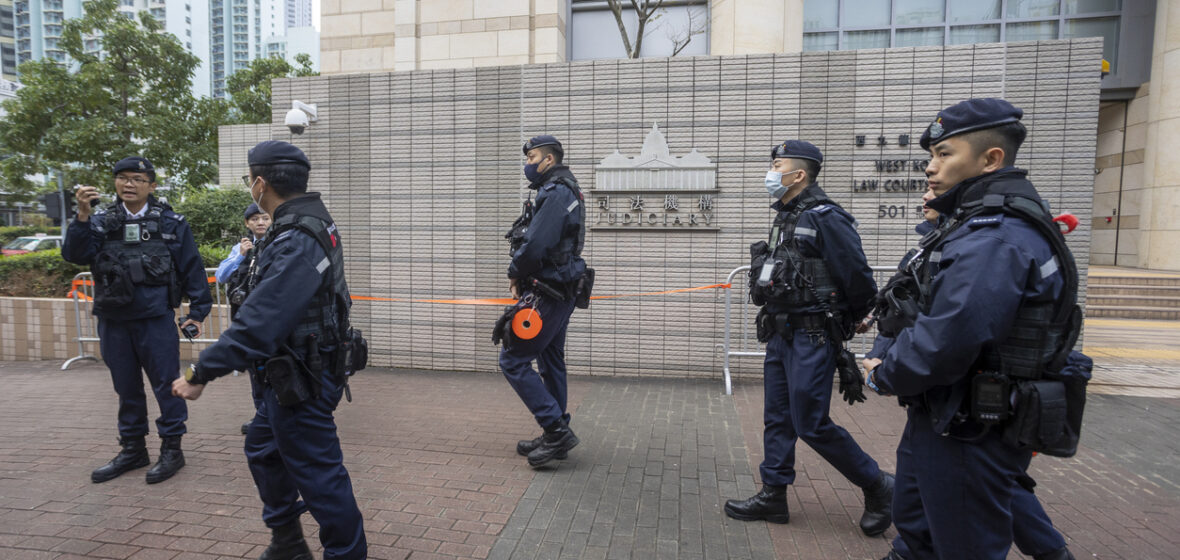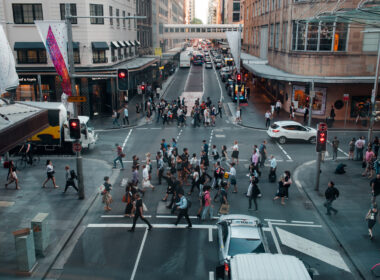On November 19, the pro-democracy activists collectively known as the Hong Kong 47 received their sentences from the High Court relating to charges of conspiracy to commit subversion or undermine the appointed government during Hong Kong's largest national security trial. The 47 activists including former legislators, councillors, and academics were arrested in 2021 under the newly introduced national security law (NSL).
In July 2020, merely weeks after Beijing’s NSL was introduced on June 30, the activists had participated in an unofficial primary election leading up to legislative elections that attracted 600,000 voters of the 7 million population. For Beijing, this election was the culmination of months of protest by pro-democracy activists and the arrests are broadly seen as a severe punishment for peaceful, political protest.
The Election Committee is mostly made up of lawmakers, executives, and the chief executive selected by Beijing. Hong Kongers can directly vote for about 20 per cent of the legislature. Had the pro-democracy activists been successful, they were aiming to take a majority of the 70-seat legislature.
After a 118-day trial, the longest sentence of 10 years was given to the legal academic, 60-year-old Benny Tai, who pleaded guilty to the accusation that he had been an organiser – or “mastermind” who “advocated for revolution” according to the judgement, posted online – of electoral activity, intending to rally pro-democracy voters to achieve a majority in the legislative council (known as LegCo) election, giving them the power to vote down Beijing-imposed bills, legislature, and ultimately to force the resignation of the chief executive.
LSJ spoke with Sophie Richardson, a longtime activist and scholar of Chinese politics, human rights, and foreign policy. She’s presently a visiting scholar at the Center on Democracy, Development and the Rule of Law at Stanford University. From 2006 to 2023, she served as the China Director at Human Rights Watch.
“The verdicts are meant to show the extent of Chinese government control over Hong Kong peoples’ legal, political, and civic lives,” she says. “When the judiciary was an independent, professional guarantor of the rule of law, it would have been highly unlikely anyone would have been prosecuted—let alone convicted—for organising an informal poll.”
The NSL was introduced in 2019 by the Chinese government to criminalise acts of dissent, sedition, and foreign collusion. Leading up to the primary elections, Hong Kong minister Erick Tsang had issued a warning that the election could violate the NSL. The defiance of this warning was labelled “subversion” by the courts.
Richardson says, “Treating the peaceful exercise of clearly guaranteed rights as subversive is the longstanding CCP norm in the mainland; that reality now extends to Hong Kong. At least two dynamics have driven that outcome: Hong Kong peoples’ peaceful, courageous insistence that their rights be respected—which Beijing would not tolerate—and the near-total lack of punitive consequences for Beijing.”
Tai and former lawmaker Alvin Yeung, 43, – who received five years and one month – were handed harsher sentences for being lawyers, which the court said was because the two knew the law but were “absolutely adamant in pushing for the implementation of the scheme.”
Guilty pleas were entered by 31 of the accused, while 16 pleaded not guilty – receiving more severe sentences. Two were acquitted at trial: former district councillors Lawrence Lau and Lee Yue-shun. Most have already spent three years imprisoned.
The pre-trial hearing at the West Kowloon Magistrates’ Court took place from March 1 to 4 in 2021, then continued in June 2022. Many of the defendants were denied bail and remanded in prison. Three of the judges hearing arguments were hand-picked by the pro-Beijing government.
Lawyers for the defendants said the primary election was not an attempt to overthrow the government, but to exercise the democratic right to vote, and that no eventual coup “scheme” would have resulted.
Gordon Ng, the Australian-Hong Kong dual national, pleaded not guilty and was sentenced to over seven years. Foreign Minister Penny Wong stated the government has voiced its “strong objections to the Chinese and Hong Kong authorities on the continuing broad application of national security legislation”.
In an August 2022 statement posted online by an intermediary, Ng had said: “Do I think I have committed a crime? I don’t, I absolutely don’t. I am ready to face the largest battle of my life in the battlefield of court. I fear, but I don’t retreat.”
Senator Simon Birmingham, Opposition foreign affairs spokesperson, said in a statement that the sentencing of the activists was “appalling and unacceptable”.
The sentences, he continued, “serve as another stark reminder of the Chinese Government’s continued attacks on freedoms and rights in Hong Kong”.
He said the current government has the Coalition’s bipartisan support “to emphatically pursue Australia’s rejection of the persecution and detention of Gordon Ng and other pro-democracy advocates in Hong Kong”.
Another to plead not guilty, former Stand News journalist Gwyneth Ho, received a seven-year jail sentence, prompting her to issue a statement on social media, asserting that her sentence was the result of her running as a candidate in 2020 in “the last free and fair election in Hong Kong”.
Owen Chow, 27, received the second lengthiest sentence after Tai – seven years and nine months – for running as a candidate in the election. Joshua Wong, 28, a former student leader, received four years and eight months after pleading guilty, and lawmaker Claudia Mo, 67, received four years and two months, after also pleading guilty.
The European Union labelled the sentencing an “unprecedented blow against fundamental freedoms, democratic participation and pluralism in Hong Kong”. In a statement, the United States Consulate in Hong Kong said, “We call on [Beijing] and Hong Kong authorities to cease politically motivated prosecutions of Hong Kong citizens and to immediately release all political prisoners and individuals jailed for their peaceful advocacy for rights and freedoms.”
Hundreds gathered outside the court to protest throughout the trial.
Kevin Yam is a lawyer who lived in Hong Kong for 20 years before returning to Australia in 2022. In July 2023, he was one of eight overseas-based activists accused by the city’s police on Monday of breaching its national security law.
He tells LSJ, “The sentencing of 45 pro-democracy Hong Kong activists last week under Hong Kong’s National Security Law serves as yet another reminder that four retired Australian judges still serve on Hong Kong’s Court of Final Appeal. 10 foreign judges from Australia, England and Canada have quit this court since the introduction of the National Security Law.”
“Whereas Australian judges were once part of a deep bench of foreign judges from leading common law jurisdictions, they now make up four out of six of the remaining judges. While Australian judges have decided to stay on the court with the hopeful and noble intent of supporting Hong Kong’s rule of law, they now risk being seen as outliers as their counterparts from other leading jurisdictions quit. Further, they do not in fact get to sit on National Security Law cases, which are reserved for local government-designated judges.
“In addition, the reality is that while the four Australian judges deservedly command respect as individuals, they would unlikely have been appointed to the Hong Kong court in the first place if Australia overall was not considered a leading common law jurisdiction. As such, while these appointments are strictly speaking individual appointments, their continued presence in the face of an intensifying crackdown in Hong Kong and the departure of equally respected counterparts from other jurisdictions is a matter [that] should attract greater attention from and discussion within Australia’s legal profession.”
Former Hong Kong legislator and activist, Ted Hui, also fled to Australia. Hui and Yam have a bounty of HK$1 million ($191,883) placed on them as a reward for information leading to their arrest.
In September this year, Hui told SBS, “It’s supposed to be a system that allows recognition that the Hong Kong common law system will be in sync with Western Democracies, but at the same time [the foreign judges] are lending their own reputations and integrity of their respective jurisdictions to Hong Kong’s already eroded and authoritarian regime.”
The Australian judges serving in a private capacity, having retired, are former High Court Judges Patrick Keane and William Gummow, former High Court Chief Justice Robert French and former Federal Court Chief Justice James Allsop (since May 2024).
The Australian judges are offered briefings by the Department of Foreign Affairs and Trade (DFAT) on Australia’s approach to Hong Kong’s national security legislation.
Following his resignation, former British Supreme Court Justice Jonathan Sumption wrote an opinion piece for the Financial Times, stating: “Hong Kong, once a vibrant and politically diverse community, is slowly becoming a totalitarian state. The rule of law is profoundly compromised in any area about which the government feels strongly.”
LSJ asked Richardson’s opinion on whether there was any prospect of the sentences being reviewed or softened, and the obligation upon the international community to respond, especially in the situation of dual citizens being sentenced.
She says, “The most compelling reasons for democracies to respond forcefully—sanction Beijing and Hong Kong officials, suspend forms of non-essential cooperation Beijing wants, legally require companies based in democracies to comply with human rights due diligence before doing business in HK—is not just because it’s the right thing to do, or because there are dual citizens being prosecuted. It is because Beijing’s relentless assault on human rights does not stop at the [People’s Republic of China] PRC’s borders, even when international law—like the SBJD [Sino-British Joint Declaration], like the ICCPR [International Covenant on Civil and Political Rights] —says otherwise. This problem is getting worse, not better, and that’s a result of 40 years of kicking the can down the road, pursuing self-interested “engagement” at the cost of frontally challenging an increasingly powerful authoritarian regime. As democracies grapple with grim developments like these sentences in Hong Kong, and with increasing Chinese government threats to human rights in their own countries, perhaps Beijing’s sense of impunity will finally prompt them to act.”
In May this year, current and former politicians from nine countries, including former UK Conservative party leader Iain Duncan Smith and former defence minister for Japan, Gen Nakatani, demanded to be called as witnesses in Jimmy Lai’s trial.
Founded in 2020, the Inter-Parliamentary Alliance on China (IPAC), the members claim to have been cited more than 50 times in Lai’s national security trial, and have requested to submit evidence to the court. IPAC is formed of lawmakers from 34 legislatures and parliamentary bodies who are pushing for a coordinated policy from democratic countries towards China on issues such as trade, security and human rights. Hong Kong’s National Security law has been vehemently decried by the group, which has stated that it made “Hong Kong one of the most dangerous places in the world to disagree with the government”.




